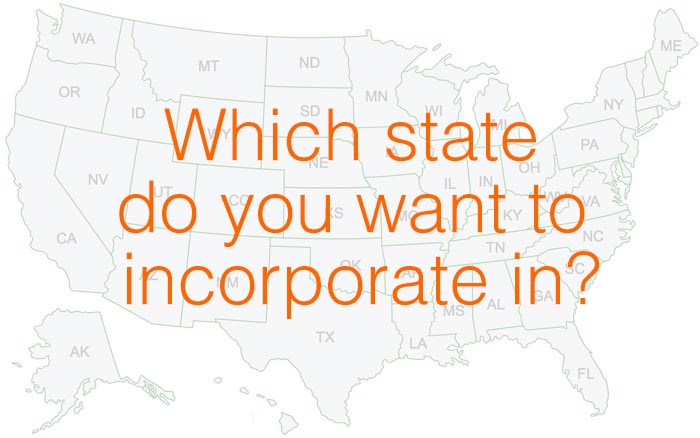
Starting a business has never been so fast, easy and affordable.
FREE business incorporation, including registered state agent
Just pay state fees, order in 5 minutes or less
Limited Liability Company
Forming a limited liability company protects your personal assets by keeping them separate from your business assets, and it provides the greatest flexibility available when it comes to taxation and business structure.
An LLC is the most common choice for small businesses with a single proprietor or a small number of members, as it offers the protections of incorporation without the same requirements necessary for larger, multi-shareholder companies.
S Corporation
S corporations offer specialized taxation that limits the company’s liability. When you form an S corporation, the company itself isn’t taxed. Instead, profits and losses are tallied and taxed after being distributed to shareholders.
For this reason, an S corporation is most often chosen by companies incorporating with multiple shareholders, and is considered a good alternative to legal business partnership because it provides tax benefits without the overhead and complexity.
C Corporation
In C corporations, profits are taxed at the business level before being distributed to shareholders, but the main feature of this type of incorporation is that it offers certain advantages that some companies require.
Specifically, a C corporation is the only option available for US companies choosing to work with foreign investors. Forming a C corporation also allows you more flexibility with shareholder involvement by making it possible to create multiple classes of stock.

“Thanks. All went well. The information was received in a timely manner. Email responses were prompt. Will definitely use your services again in the future.”
2Gz Int’l LLC, TX

“Thanks for the prompt response to our order. Everything went smoothly and our business is off to a great start.”
Collective Spirits, Inc., MN

“I have used maxfilings many times and the best part is how easy you make things and how fast you get things done. Everything was set up perfectly. Thank you very much!”
Limitless Communications of Farmingdale Inc., NY
Still undecided? Let us help!
Our knowledge center is full of helpful information to assist you in the decision-making and incorporation process. Check out some of our most popular guides:
- Best State to Incorporate a Business
- C Corporation FAQs
- S Corporation FAQs
- LLC FAQs
- Form a C Corporation
- Form an S Corporation
- Form an LLC
- Differences Between C Corporations & S Corporations
- Business Entity Comparison Chart

The Best & Worst States to Incorporate In
Tax climate is one of the biggest factors business owners want to know about before incorporating. Find out which states have the best business tax climate for forming an LLC or corporation.

The Best & Worst States for Minority-Owned Small Businesses
Which states rank highest and lowest for racial diversity in entrepreneurship, both in volume and by proportion? See top 10 best and bottom 10 worst states.

The Best & Worst States for Women-Owned Small Businesses
How does your state rank when it comes to women-owned small businesses? Check out state-by-state rankings for female entrepreneurship in the U.S.

The Best & Worst States for Small Business Lending
Is getting a business loan an important step in funding your company? Look at a complete state-by-state ranking of small business loan statistics to help decide where to form your corporation or LLC.
The MaxFilings Difference
Easy, fast, reliable
You want to spend your time running your business, not dealing with paperwork. Let us handle the nuts and bolts while you get back to making your company a success.
Clear, upfront pricing
Incorporate with confidence knowing you’ll find no hidden fees, and no unnecessary extras. The price you see is the price you pay for the online incorporation services you need. View our fees
Order when YOU are ready
Your business, your timeline. You can save your information with no charge or obligation, and come back any time to continue the process at your convenience. Get started now
Stay in the loop
We keep you updated on every step of the process from start to finish, so there’s no guessing and wondering. You’ll always know where your company stands in the incorporation process.
Satisfaction 110% guaranteed
We’re so sure about our pricing and service that your satisfaction is guaranteed 110%. If you find a lower price after incorporating with MaxFilings, we’ll refund the difference plus 10%
We Care About Your Success
At MaxFilings, we want your business to be a success, so we provide the tools and information you need before, during and even after incorporation. Start your research in our learning center
Take Your Business Further
Incorporation is one step in the path to success, but the right online promotion gives your business the extra boost it needs to surpass the competition. Our partnerships with companies that serve entrepreneurs like you allow us to not only get your business incorporated, but help you build your brand’s profile and grow your online presence. Learn more about our partnership with premiere marketing firm SEO Advantage, and find out how once we’ve helped you start your business, our partners can help you grow and thrive.






